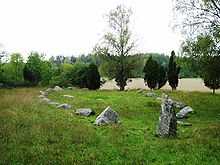Runsa
| Runsa | |
|---|---|
| Upplands Väsby Municipality, Sweden | |
| Type | ancient hill fortification |
| Site information | |
| Condition | ruins |
| Site history | |
| In use | prehistoric |

Runsa is the site of the ruins of an ancient fortification (Runsa fornborg) located in Upplands Väsby Municipality in Sweden.[1][2]
History
Runsa was a prehistoric hill fortification. Runsa was strategically situated on a 30 metre high rock promontory in Lake Mälaren, with views towards Sigtuna. The ancient fort covers an area of 200 x 100 metres. The site was excavated first in 1902 with the participation of Crown Prince Gustaf VI Adolf of Sweden. It was later investigated by archaeologists in 1992.
Below the ruins is a stone ship burial area (Runsa skeppssättning) with some 30 graves. The burial ground is made up of round stones estimated to date from 400 - 500 AD. It is 56 feet from the bow to the stern and is one of the best known stone circles in Sweden.[3]
Runsa manor (Runsa herrgård) is surrounded by the ruins of Runsa and other monuments. In 1313 the estate was sold to the Archbishop of Uppsala. It was suppressed by King Gustav Vasa, but was sold by his grandson Jacob De la Gardie. The main building, from the mid-1600s, and was most possibly built countess Ebba Brahe, who was the mistress of King Gustavus Adolphus.
See also
- List of castles in Sweden
References
Sources
This article is fully or partially based on material from Nordisk familjebok, Runsa, 1904-1926.